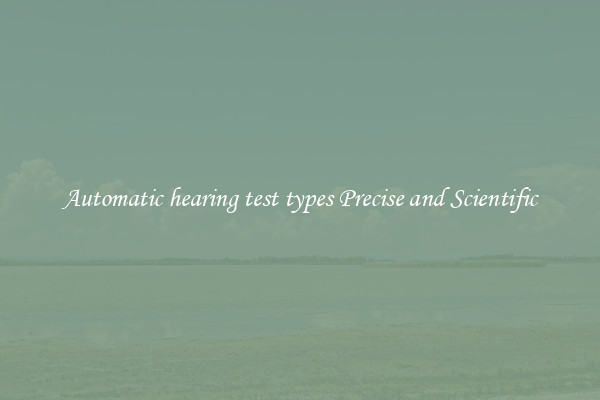Automatic hearing test types Precise and Scientific
Automatic Hearing Test Types: Precise and Scientific

Hearing loss is a common health issue that affects millions of people around the world. The ability to hear and communicate plays a vital role in our daily lives, and therefore, it is crucial to detect and address any hearing difficulties promptly. Automatic hearing tests have emerged as a convenient and effective way to diagnose hearing loss accurately. These tests are precise, scientific, and offer numerous benefits over traditional manual methods.
Automatic hearing tests use advanced technology and software algorithms to measure an individual's hearing ability. They are designed to provide a comprehensive evaluation of hearing thresholds across different frequencies. By presenting various tones, the tests can determine the softest sounds a person can detect at different pitch levels. The use of automation eliminates the subjective element, ensuring accurate and reliable results.
One popular type of automatic hearing test is the Pure Tone Audiometry (PTA) test. PTA utilizes a computer-based system that presents pure tones at specific frequencies and different volume levels. The individual wears headphones and indicates when they can hear the tones. The automated software adjusts the volume levels accordingly, ensuring precision in measuring hearing thresholds. PTA tests are widely used in clinics, hospitals, and audiology centers to diagnose different types and degrees of hearing loss.
Another type of automatic hearing test is the Speech Audiometry test. This test evaluates an individual's ability to understand and discriminate speech sounds. It uses recordings of spoken words or sentences at different volumes to assess speech recognition thresholds. The software algorithms analyze the responses, enabling accurate determination of an individual's speech understanding abilities.
One of the significant advantages of automatic hearing tests is their scientific nature. They rely on objective data and measurements, leaving no room for interpretation or bias from the administrator. The results are quantifiable and can be easily compared and analyzed. This scientific approach allows for more accurate diagnosis and treatment planning.
Additionally, automatic hearing tests offer convenience and accessibility. They can be carried out remotely or at home, using online tools or mobile applications. This accessibility is particularly beneficial for individuals who have difficulty scheduling in-person appointments or live in remote areas with limited access to audiology services. Automatic tests can save time and resources for both the individual and the healthcare provider.
In conclusion, automatic hearing tests provide precise and scientific evaluations of hearing ability. With their advanced technology and software algorithms, these tests offer accurate measurements of hearing thresholds and speech understanding abilities. They eliminate subjectivity, ensuring reliable results that aid in the diagnosis and treatment of hearing loss. Moreover, their convenience and accessibility make them a valuable tool in improving accessibility to audiology services. As technology continues to advance, automatic hearing tests will likely play an increasingly significant role in identifying and addressing hearing difficulties.

View details

View details

View details

View details








